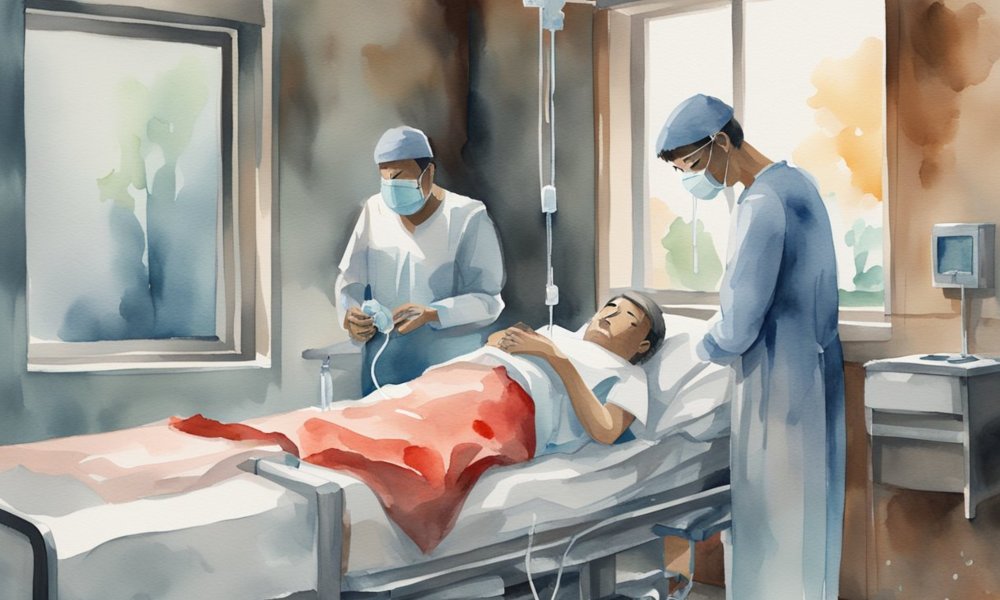Many people in the UK were infected with HIV, hepatitis, and other diseases from the 1970s to 1990s after receiving contaminated blood or blood products. A significant report exposed this shocking scandal. Here are the key points:
- Over 30,000 people were infected due to the use of unsafe blood
- The government has apologized for this “day of shame”
- Victims attended an event to respond to the report’s publication
- They shared devastating stories of lives upended by infection
- Compensation for victims was expected to be announced soon
Why is this so important? Thousands suffered terribly, and many died due to significant errors and negligence by those responsible for the nation’s blood supply.
Life Shattered by Infected Blood
Roger Newman has lived under the shadow of contaminated blood products. Born with hemophilia, he was infected with HIV and hepatitis C as a teenager after receiving tainted factor treatments.
“When I was 15 or 16, my doctor told my mom that not only me but my brother too was HIV positive,” Roger shared. “Later he said we probably only had a couple years to live at that point.”
Roger then learned he also had hepatitis C, undergoing grueling treatment that made him extremely ill. As if that wasn’t enough, he was later informed he may have been exposed to variant Creutzfeldt-Jakob disease (mad cow disease) due to another contaminated donation.
“Every time I need a medical procedure, I have to disclose this and it causes complications with treatment,” Roger said. “It was just one thing after another, my entire life overshadowed.”
Families Devastated by Infected Blood Tragedy
David Abdo’s father passed away at age 52 after receiving an infected blood transfusion. For David and his family, the trauma was compounded by having to keep it secret for years.
“I’ve always been alone with this,” David said at the event. “We never talked about it as a family. Being there with so many others in the same position brought out all the feelings I’ve had bottled up for 30 years.”
David, who now works for the NHS, said being surrounded by fellow victims provided a powerful sense of community and validation after decades of silence.
“For the first time, we heard the truth being spoken so clearly,” he said. “It felt like a massive release, to no longer be ashamed or alone in this.”
Shocking Unethical Practices Revealed
The inquiry report exposed appalling unethical practices that contributed to the scandal like pharmaceutical companies infecting children test subjects instead of using chimps to save money.
“The evidence is absolutely shocking,” Roger stated. “It’s unbelievable that children were used for research this way, putting our lives at risk.”
Sarah Westby, a solicitor representing 300 affected clients, emphasized that any compensation must include certain overlooked groups:
“We need to see people infected after 1991, victims of hepatitis B, and those without medical records proving infection all included in whatever framework is established.”
With an estimated one victim still dying every four days, Sarah stressed the urgent need to “see this compensation rolled out swiftly and comprehensively.”
Accountability Still Lacking?
While welcoming the government’s apology, victims like David want clear accountability and actions.
“There’s lots of talk, but I’m not seeing real consequences yet for those responsible,” David stated. “How can we move forward without understanding who was accountable and what allowed this to happen?”
Roger agreed criminal charges should be considered, pointing to the destruction of evidence that could be prosecuted in other contexts.
“People involved in decisions that risked and cost thousands of lives should be taken to court,” he insisted. “They seem to have hidden behind their power and position.”
With an estimated 3,000 victims having already died, both men stressed that time is running out to deliver true justice.
So while an initial apology and promise of compensation are welcomed first steps, victims of the worst treatment disaster in NHS history are clearly seeking much more – full transparency, accountability, and an ensuring such negligence never happens again.
How will the government respond to uphold the rights and dignity of those whose lives were shattered by this preventable tragedy? Only time will tell.
















